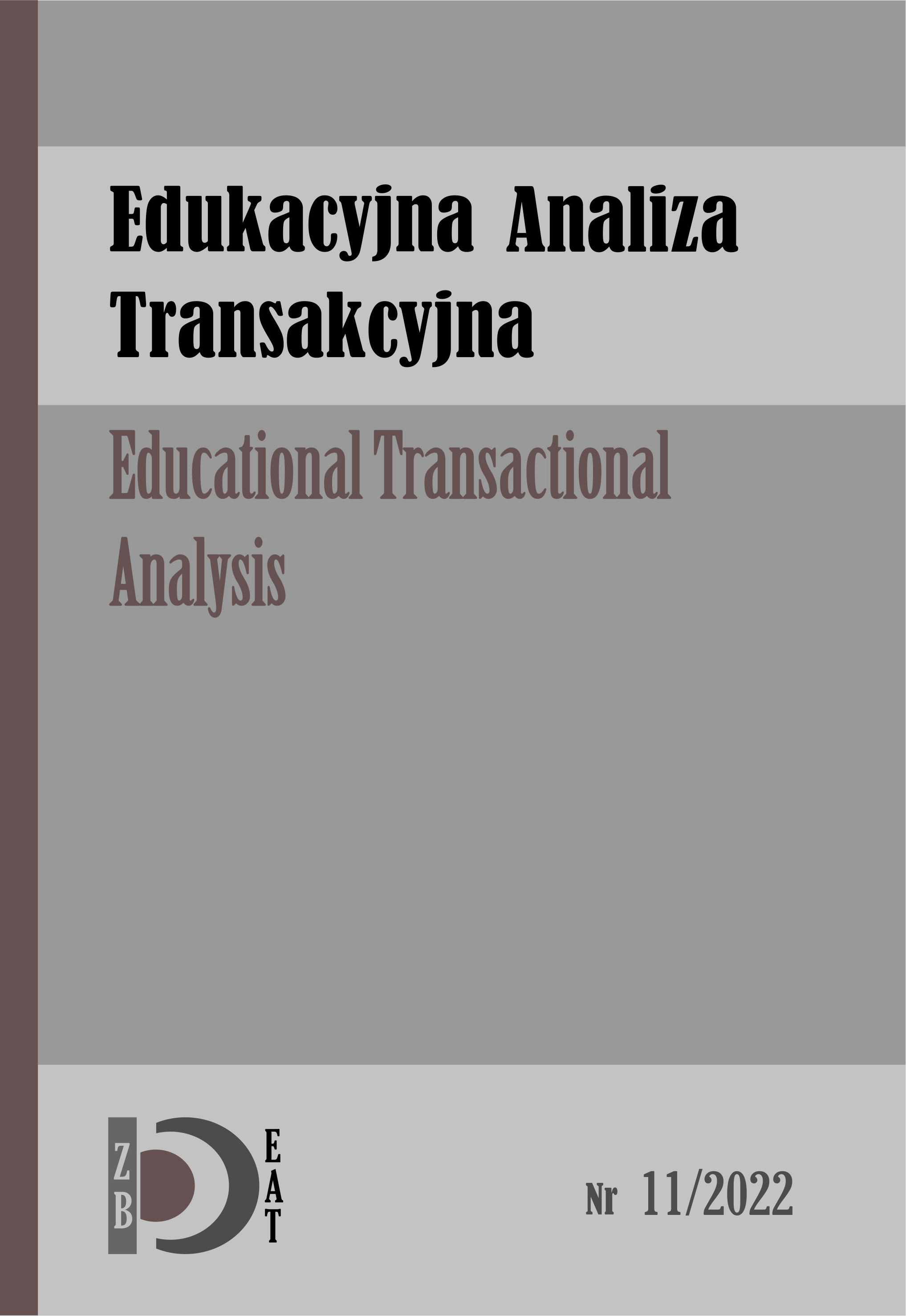Motywacja oraz motywowanie w procesie kształcenia w ujęciu teorii analizy transakcyjnej
DOI:
https://doi.org/10.16926/eat.2022.11.01Słowa kluczowe:
motywacja, motywowanie, analiza transakcyjna, stany Ja, symbiozy, kontaminacje.Abstrakt
W artykule przedstawiono niektóre aspekty motywowania innych (lub jego braku) oraz wzbudzania i wygaszania motywacji u siebie przez jednostkę w procesie kształcenia w ujęciu teorii analizy transakcyjnej z perspektywy: modelu strukturalnego, koncepcji symbiozy pierwszego i drugiego stopnia oraz modelu patologii strukturalnej na przykładzie kontaminacji. W zakresie ostatniej koncepcji, zaprezentowano wybrane wyniki badań własnych. Ich celem było między innymi rozpoznanie, w jakim stopniu nauczyciele posługują się nieskontaminowanym stanem Ja Dorosły oraz kontaminacjami (Rodzicielskimi, Dziecięcymi, Podwójnymi) w odniesieniu do procesu kształcenia. Jednym z celów badań było także poznanie treści stanu Ja nieskontaminowanego Dorosłego u nauczycieli oraz treści i rodzaju kontaminacji nauczycielskich odnośnie procesu kształcenia.
Downloads
Bibliografia
Berne, E. (2008). Dzień dobry… i co dalej? Poznań: Dom Wydawniczy Rebis.
Berne, E. (1966). Principles of group treatment. New York: Oxford University Press.
Berne, E. (2007). W co grają ludzie. Psychologia stosunków międzyludzkich. Warszawa: Wydawnictwo Naukowe PWN.
Chéreau, M. (2018). La motivation à l’adolescence un enjeu identitaire. Actualités en Analyse Transactionnelle, 162, 37-46.
Frączek, A., Smelkowska, A. (2016). Studium Analizy Transakcyjnej [Materiały niepublikowane].
Godet, J. P. (2002). Se motiver et être solidaire. Comment faire dans un environnement qui freine? [Artykuł niepublikowany przedstawiony na Kongresie Analizy Transakcyjnej we Francji].
Okoń, W. (2003). Wprowadzenie do dydaktyki ogólnej. Warszawa: Wydawnictwo Akademickie „Żak”.
Pierzchała, A. (2013). Pasywność w szkole. Diagnoza zjawiska z punktu widzenia analizy transakcyjnej. Częstochowa: Wydawnictwo im. Stanisława Podobińskiego Akademii im. Jana Długosza w Częstochowie.
Pilch, T. (red.) (2004). Encyklopedia pedagogiczna XXI wieku. T.3. Warszawa: Wydawnictwo Akademickie „Żak”.
Przybylski, P. (2021). The Three-Cornered Contract in Psychotherapy of the Adolescent and theirparents. Edukacyjna Analiza Transakcyjna, 10,115–128. Http://dx.doi.org/10.16926/eat.2021.10.06.
Sillamy, N. (1994). Słownik psychologii. Katowice: Wydawnictwo „Książnica”.
Siuta, J. (red.) (2009). Słownik psychologii. Kraków: Krakowskie Wydawnictwo Naukowe.
Steiner, C. (1974). Scripts People Live: transactional analisys of life scripts. New York: Crove Press.
Steward, I., Joines, V. (2016). Analiza transakcyjna dzisiaj. Poznań: Dom Wydawniczy Rebis.
Pobrania
Opublikowane
Jak cytować
Numer
Dział
Licencja
Prawa autorskie (c) 2022 Paulina Ratajczak

Utwór dostępny jest na licencji Creative Commons Uznanie autorstwa 4.0 Międzynarodowe.
Mam świadomość, że czasopismo jest wydawane na licencji Creative Commons - Uznanie autorstwa (https://creativecommons.org/licenses/by/4.0/legalcode).
Przesyłając artykuł wyrażam zgodę na jego udostępnienie na tej licencji

